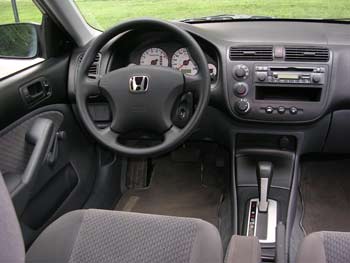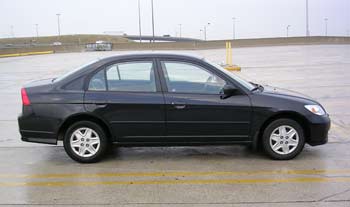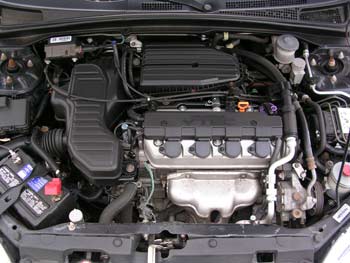2001-2005 Honda Civic: problems, engine, timing belt intervals, fuel economy
Updated: August 14, 2022
The 2001-2005 Civic is a fuel-efficient compact car. It comes as a four-door sedan or two-door coupe. The Civic handles well and has a sporty firm ride.
The Honda Civic is available in base DX, mid-level LX and top of the line EX trim levels. Transmission choices included a five-speed manual or four-speed automatic. Anti-lock brakes (ABS) are standard on EX models.
The Honda Civic has a good reputation for its reliability, although at this age it will take some time to find one in good condition without mechanical issues. What are the common problems?
2001-2005 Honda Civic Common Problems: The code P1457 could be caused by a bad EVAP canister vent solenoid. To confirm this, your mechanic will have to test the EVAP system for leaks. If a bad EVAP solenoid is confirmed, it's fairly easy to replace. Watch these videos explaining the problem.
Front end noises. Bad sway bar links could cause knocking or clunking noise in the front end; they are not expensive to replace. Bad front lower control arm bushings (aka compliance bushings) could also cause clunking noise from the front end when driving over bumps (1.3-1.5 hours of labor for one side to replace).
A bad wheel bearing will cause a humming noise that is more evident when driving faster. Replacing one front wheel bearing will cost 1.5-1.6 hours of labor plus the part.
When buying a used Honda Civic, watch out for the way the automatic transmission shifts. Test drive for as long as possible to get the good feel how the transmission shifts. If it doesn't shift "right", avoid the car. Check the transmission fluid on the dipstick; if it's too dirty or has a burnt smell, avoid the car. The transmission fluid must be changed regularly to keep the transmission last longer.
Overheating: There are complaints about the engine overheating. Mechanics use an infrared pyrometer to diagnose engine cooling system issues. The thermostat needs to be checked first, as a stuck-closed thermostat is one of the common causes for overheating. Replacing the thermostat is not very expensive.
The radiator could be partially clogged up and will also need to be checked. Mechanics also test the radiator cap and check if the cooling fan comes on at the right temperature. If the radiator cap is a suspect, it's usually replaced, as it's not expensive.
A leaking head gasket can also cause the engine to overheat and it's a fairly common failure l on this car. Mechanics test the coolant for presence of exhaust gases that will indicate a bad head gasket. Replacing a head gasket in the shop will cost 4-5 hours of labor plus the parts. If you are buying a used Honda Civic, have it properly inspected for a leaking head gasket.
Advertisement
The code P1298 could be caused by a faulty electronic load detector (ELD) located in the fuse box. The part is not very expensive and is fairly easy to replace. Watch these videos.
Oil leaks from the valve cover, from the cam shaft end plug and from the cam and crank seals are common, but they are not too expensive to repair. Watch these videos.
Honda has issued several recalls; check on the NHTSA website.
Honda Civic Engine: The Civic DX and LX come with a 115-hp 1.7-liter 16-Valve SOHC engine. The EX is equipped with the 127-hp 1.7-liter SOHC VTEC (Variable Valve Timing and Lift Electronic Control).
Both are simple, easy to work on engines. Both these engines have a timing belt that must be replaced at recommended intervals.
Honda Civic Timing belt: According to the maintenance schedule for the 2005 Honda Civic, a timing belt must be replaced at 110,000 miles or 176,000 km. However, if the car is driven in hot or very cold conditions, it must be replaced every 60,000 miles or 100,000 km.
The 1.7L engine in the 2001-2005 Civic is an interference engine, meaning if the timing belt breaks, the engine might get damaged. To replace the timing belt in the repair shop, you are looking at 2.5-3.0 hours of labor plus parts.
Is the 2001-2005 Honda Civic a good car to buy? If you find one that is in good mechanical condition and doesn't have problems mentioned above, the 7th generation Civic could serve well as a cheap commuter car. The Civic is good on gas, costs little to maintain and is easy to work on. Among similar cars, the Toyota Corolla is another popular choice for a cheap commuter.
Pros: Fuel economy, holds value well, interior comfort, fun to drive, low maintenance costs, trunk space, easy to work on, parts are widely available.
Cons: Noisy ride, paint scratches easily, automatic transmission and head gasket issues, timing belt will need to be replaced.
Crash test ratings: The NHTSA awarded the 2001-2005 Honda Civic with a five-star rating for the frontal crash tests. In frontal offset crash tests performed by the Insurance Institute for Highway Safety (IIHS), the 2001-2005 Honda Civic received a "Good" overall rating.
Civic Si: The sporty Si (SiR in Canada) hatchback was added for 2002, but they are rare on the used car market. The 2002-2005 Civic Si comes with a high-revving 160-hp 2.0L DOHC i-VTEC engine, manual transmission (no automatic) and firmer suspension.
Related reviews:
1998-2008 Toyota Corolla
2006-2011 Honda Civic
2012-2015 Honda Civic
2004-2009 Mazda 3
2002-2006 Toyota Camry
2003-2010 Pontiac Vibe
2003-2008 Toyota Matrix
2010-2013 Mazda 3
2009-2013 Toyota Corolla
What to look for when buying a used Honda Civic: When inspecting a car, check the transmission fluid; if it's too dirty or smells with burnt oil, avoid the car. During the test drive, watch for signs of problems with the automatic transmission; slipping, harsh sifting and other transmission issues should tell you to avoid the car. Read also: Signs of automatic transmission problems when test driving a used car.
In the Honda Civic with a manual transmission, watch out for noises from the transmission or the clutch. Check if the timing belt has been replaced; if not, you will have to have it done. Watch out for "racing" mods like a cold intake or lowered suspension; you don't want a car that could have been abused by previous owners.
A blown head gasket is also fairly common; watch out for signs of cooling system problems such as engine temperature rising above normal, coolant residue around the radiator cap, a lack of heat from the vents and low coolant level. If the engine misfires and runs rough when started or there is a blue smoke at a start-up, avoid the car. It's a good idea to have the vehicle inspected by your mechanic before buying. Read also:
How to inspect a used car - illustrated guide.
Signs of engine problems when test-driving a used car
Honda Civic Maintenance Tips: Regular oil changes are important to keep your engine in good shape. The timing belt needs to be changed every 110K miles or sooner. It might be a good idea to replace the water pump when changing the timing belt.
Change the transmission fluid more often to keep the transmission clean inside; use only original Honda transmission fluid. Check out our Basic 12-point Car Maintenance Checklist with Photos
Considering that overheating of the engine may cause more problems, keep the coolant level topped up. If the engine temperature rises above normal, have the cooling system checked.
Fuel economy: The EPA rates the 2004 automatic Honda Civic EX (1.7L VTEC) at 26/35 mpg or 9.0/6.7 L/100 km on regular gasoline. This means you can get up to 360 miles to a tank (13.2 gallons or 50 liters). Not many cars for this price can beat that.
| Honda Civic EPA Fuel Economy: | mpg city/hwy |
L/100 km city/hwy |
| 2001 DX, LX, EX auto | 26/34 | 9.0/6.9 |
| 2002 LX, DX auto | 26/34 | 9.0/6.9 |
| 2003 EX auto | 26/34 | 9.0/6.9 |
| 2002, 2004, 2005 EX auto | 26/35 | 9.0/6.7 |
| 2003-2005 DX, LX auto | 25/34 | 9.4/6.9 |
| 2001-2002 DX, LX manual | 28/33 | 8.4/7.1 |
| 2001-2002 EX manual | 27/33 | 8.7/7.1 |
| 2003 DX, LX, EX manual | 27/35 | 8.7/6.7 |
| 2004-2005 DX, LX, EX manual | 27/34 | 8.7/6.9 |


